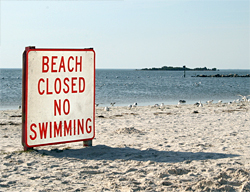WHOI Research

Visit the WHOI Topic on Beach Closures.
Research in general
Scientists are looking for microbes to use as specific indicators of human fecal contamination. They are also trying to develop ways of detecting contamination that are faster than the tests now in use, which require 24 hours to get the results. That will enable them to more rapidly make decisions about whether to close a beach—and whether to open it again. One of their most promising tools is the Environmental Sample Processor (ESP), which is like a robotic underwater lab. It can be used to automatically sample and detect the DNA from specific organisms, such as fecal indicators.
WHOI research
Scientists at Woods Hole Oceanographic Institution (WHOI) are studying how warm water from power plants affects harmful microbes in the sea. Do higher temperatures help the infectious microbes? If we know more about temperature and other features of the water, can we do a better job of predicting when the water will be unsafe for swimmers?
For more information about WHOI research, please visit our Ocean Topic on Beach Closures.